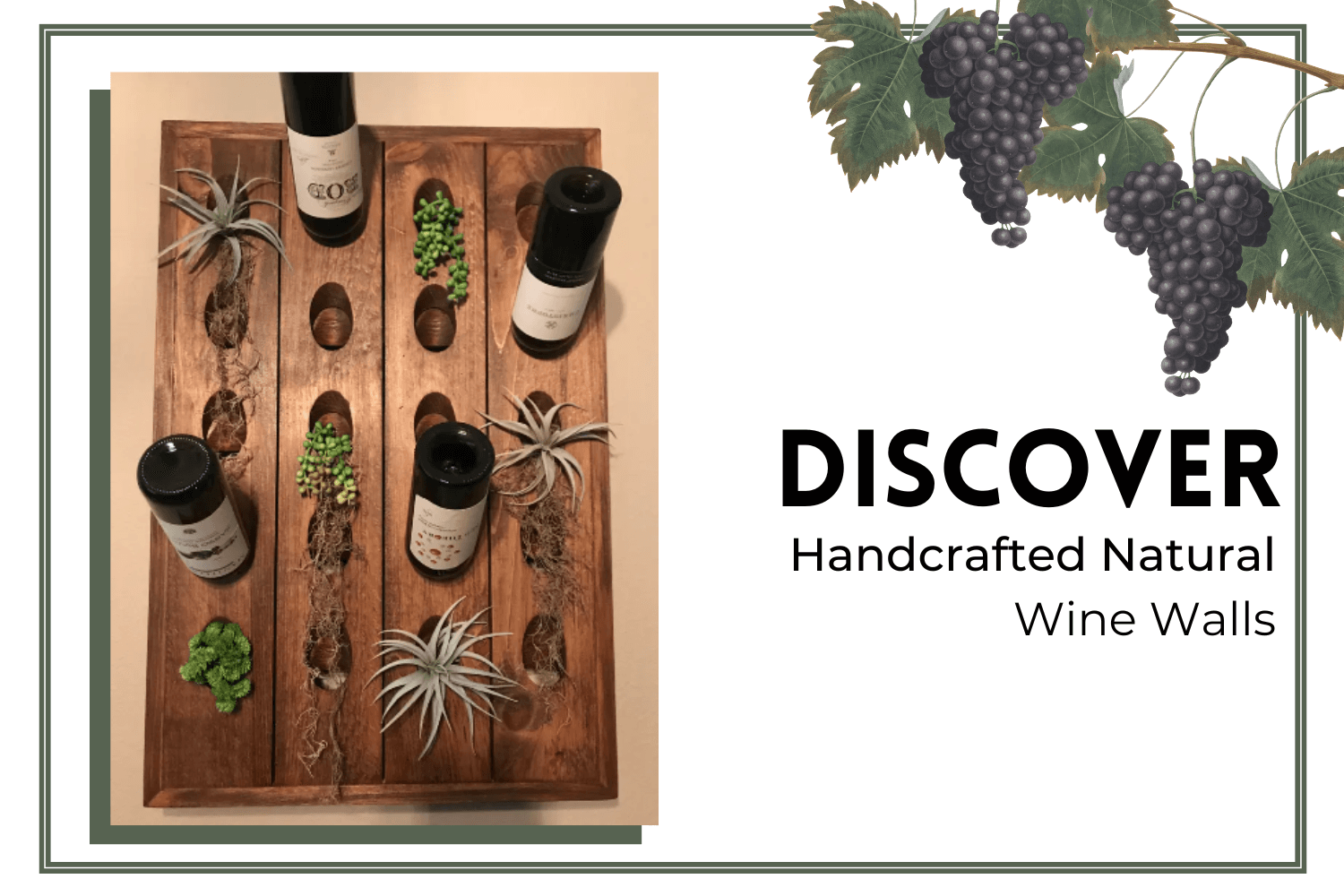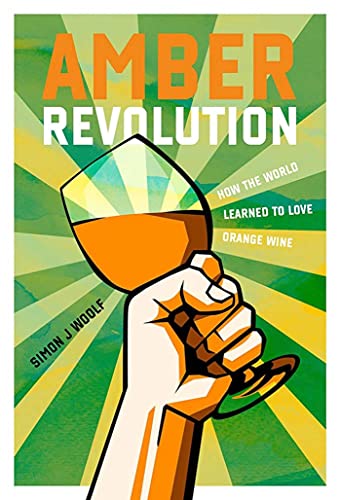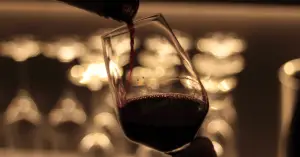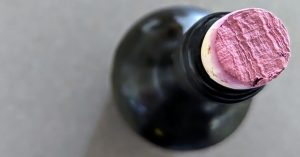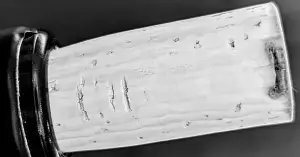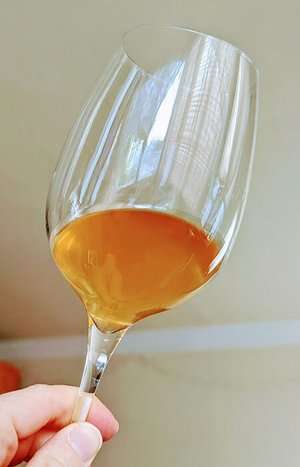
Do you have a bottle of orange wine in front of you? If so, I hope you’ll savor every sip, because these are special bottles.
Orange wines are made from white grapes that ferment on the skins. This turns the wine an amber (orange) color. It also gives the wine more body and tannin than a typical white wine. Serve orange wines slightly chilled and pair them with flavorful dishes, like carnitas, low country boils, and fried chicken.
What’s orange wine? Here’s what you need to know…
- Where Did Orange Wine Start?
- Why do they call it orange wine?
- Is Orange Wine Just Rose?
- What Does Orange Wine Taste Like?
- Why Is Orange Wine Funky?
- What Grapes Make Orange Wine?
- Why Is Orange Wine So Strong?
- Is Orange Wine Bitter?
- Does Orange Wine Need to Breathe?
- Is Orange Wine a Natural Wine?
- Does Orange Wine Have More Alcohol?
- Is Orange Wine Rare?
- Is Orange Wine More Expensive?
- Is Pinot Grigio orange wine?
- What Food Goes with Orange Wine?
- How to Serve Orange Wine?
- Do You Decant Orange Wine?
- Do You Chill Orange Wine?
- How Long Does Orange Wine Last Once Opened?
- How Long Does Unopened Orange Wine Last?
- Does Orange Wine Get Better with Age?
- Great Wine Read: Amber Revolution
- Final Thoughts – Orange Wine Puts the ‘Fun’ in Funky
- Thirsty for More?
Where Did Orange Wine Start?
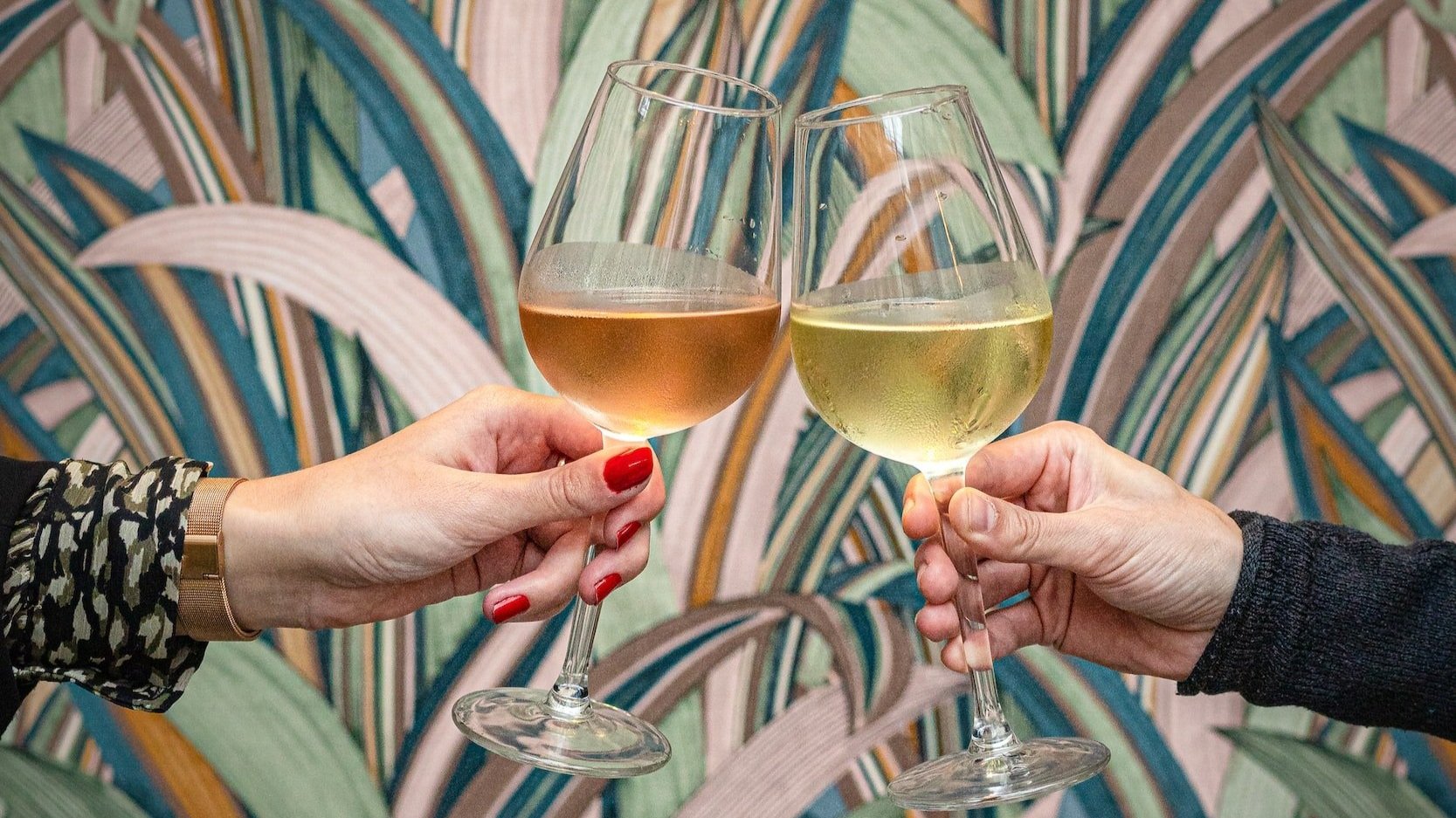
The history of orange wine can be traced back to ancient Georgia, where it’s believed to have been made as early as 6000 – 5000 BC. Back then, they made wine using a technique called “skin contact”, where the grapes were pressed and then left to ferment with the skins.
This technique of pressing the grapes and leaving them in contact with the skins through fermentation is still used today to make orange wine.
Fast forward several thousand years, and what’s old is new again. Orange wines began growing in popularity in the late 1990s and early 2000s in northeastern Italy, Slovenia, and Croatia.
All three countries have neighboring winegrowing regions, so it’s not a big stretch to imagine how the orange winemaking style spread among local winemakers.
Today, orange wine is made around the world. The style has found a cult following among wine enthusiasts looking to try something new and winemakers wanting to experiment with different winemaking techniques.
Fun Wine Fact: There are no actual oranges (the fruit) used to make orange wine.
Why do they call it orange wine?
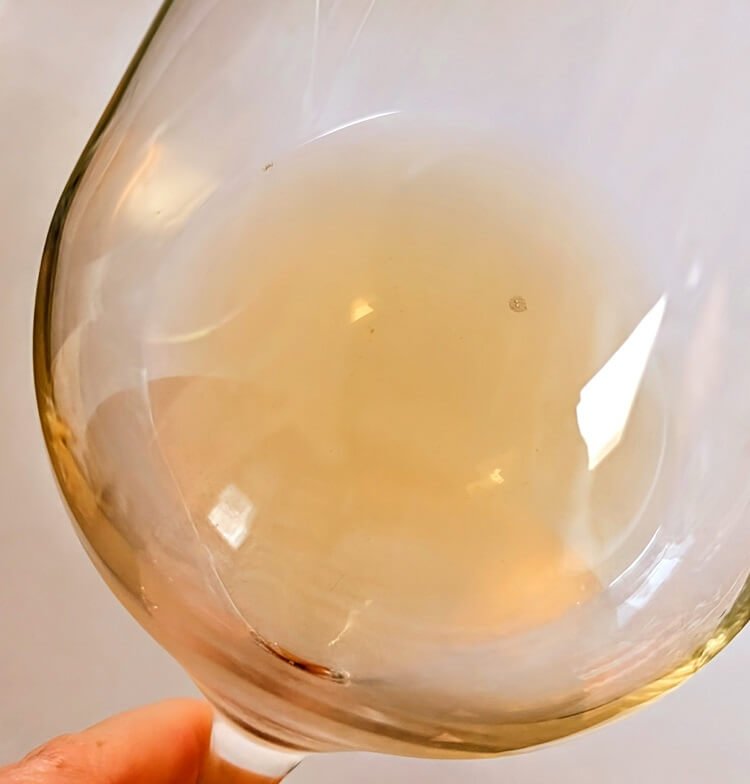
A British wine importer, David Harvey, coined the term “orange wine” to describe the amber color of skin-fermented white wines that he was tasting in Italy back in the early 2000s. When you hold a bottle or glass of orange wine in your hand, you can clearly see the amber hue – it’s not red, it’s not white, it’s not pink… it’s orange or amber.
Fun Wine Fact: You may also see orange wines referred to as amber wines.
Is Orange Wine Just Rose?
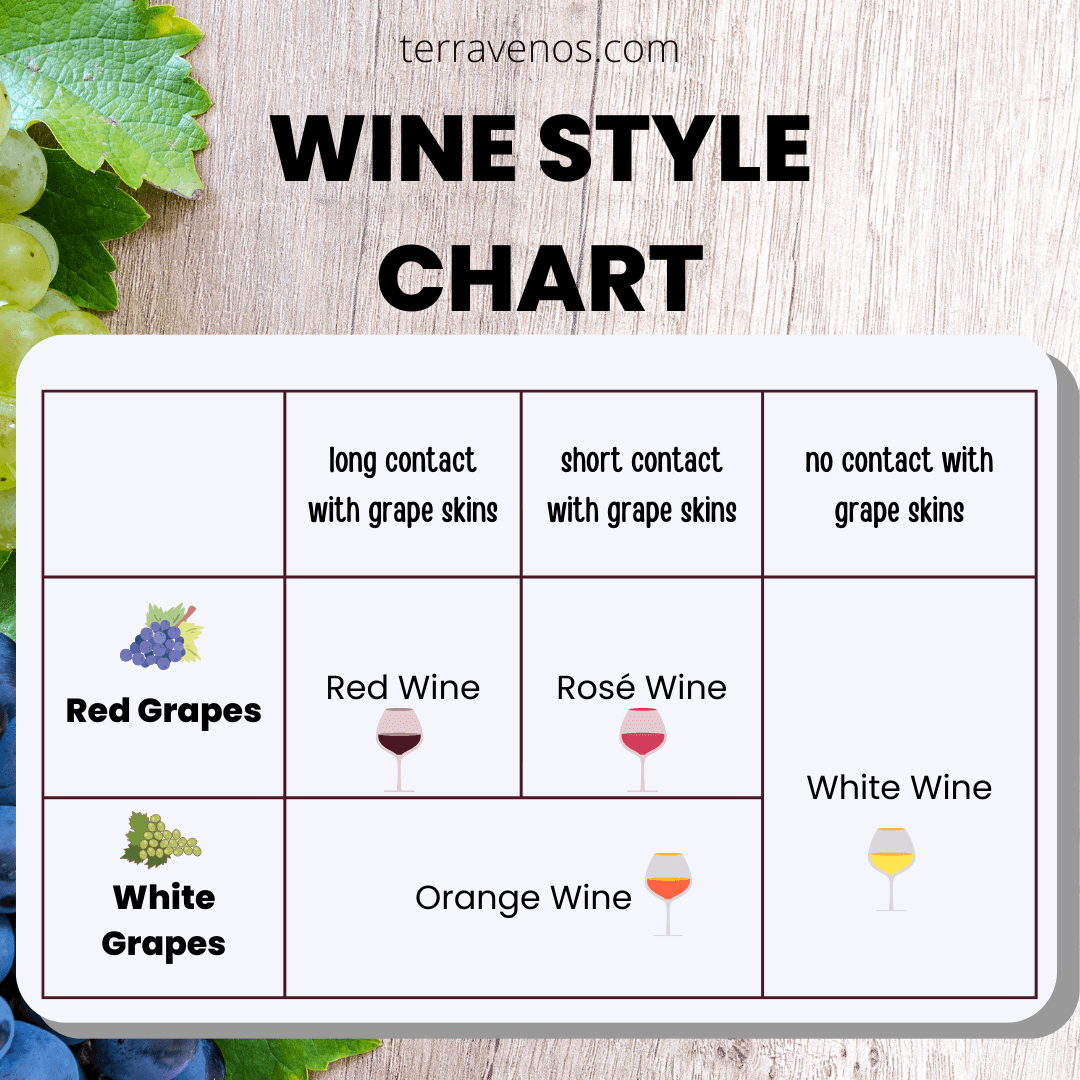
No, orange wine isn’t just rosé, but some rose wines have an orangey hue, so it can be confusing! Orange wine is made using white grapes (like Vermentino or Pinot Grigio).
Rose wines are made using red grapes, like Grenache or Pinot Noir. Orange wines maximize skin contact during the winemaking process from one week to an entire year!
Rose wines minimize skin contact to extract the perfect shade of blush or pink before fermentation.
Helpful tip: Check out how rose winemaking works in this useful post (it even has a short video because pink wines are more complicated than orange wines, believe it or not!).
What Does Orange Wine Taste Like?
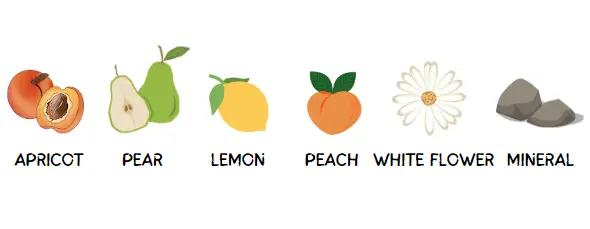
Orange wines have more body and tannin with a grippy-ness to them that white wines lack. Expect strong citrus notes, wood varnish, bruised fruits, herbs, and dried nuts and flowers.
These wines are pungent, and some describe them as funky, which can be off-putting if you’re not used to earthy wines.
Orange wines from different producers will have unique flavor and aroma profiles depending the how the winemaker treated the grapes in the winery and what grapes were used in the wine.
Orange wines can have a range of tree, stone, and citrus fruit, floral notes, and spice.
Here are a few tasting profiles of orange wines:
- Fresh pears, apricot preserves, white pepper
- Clementines, white jasmine tea, spice
- Orange blossom, honeysuckle, potpourri, chamomile
- Peach, orange rind, white flowers
- Mineral, green tea, apricot oil
Why Is Orange Wine Funky?
Orange wines can smell or taste funky thanks to their unique winemaking style. When the wine has extended contact with the skins, it can pick up additional flavor and aroma compounds, like earth, mushrooms, nuts, and spice.
The longer the skin contact, the more pronounced these flavors become.
If the winemaker decides to use a low-intervention style with minimal sulfites, you may also get some funk like barnyard or mustiness. Some people love this quirky funky quality of orange wines, others not so much.
Of course, there’s the whole tannin and astringency element in orange wines, that’s just downright unexpected (and funky) for drinkers who only know whites, reds, and roses!
What Grapes Make Orange Wine?
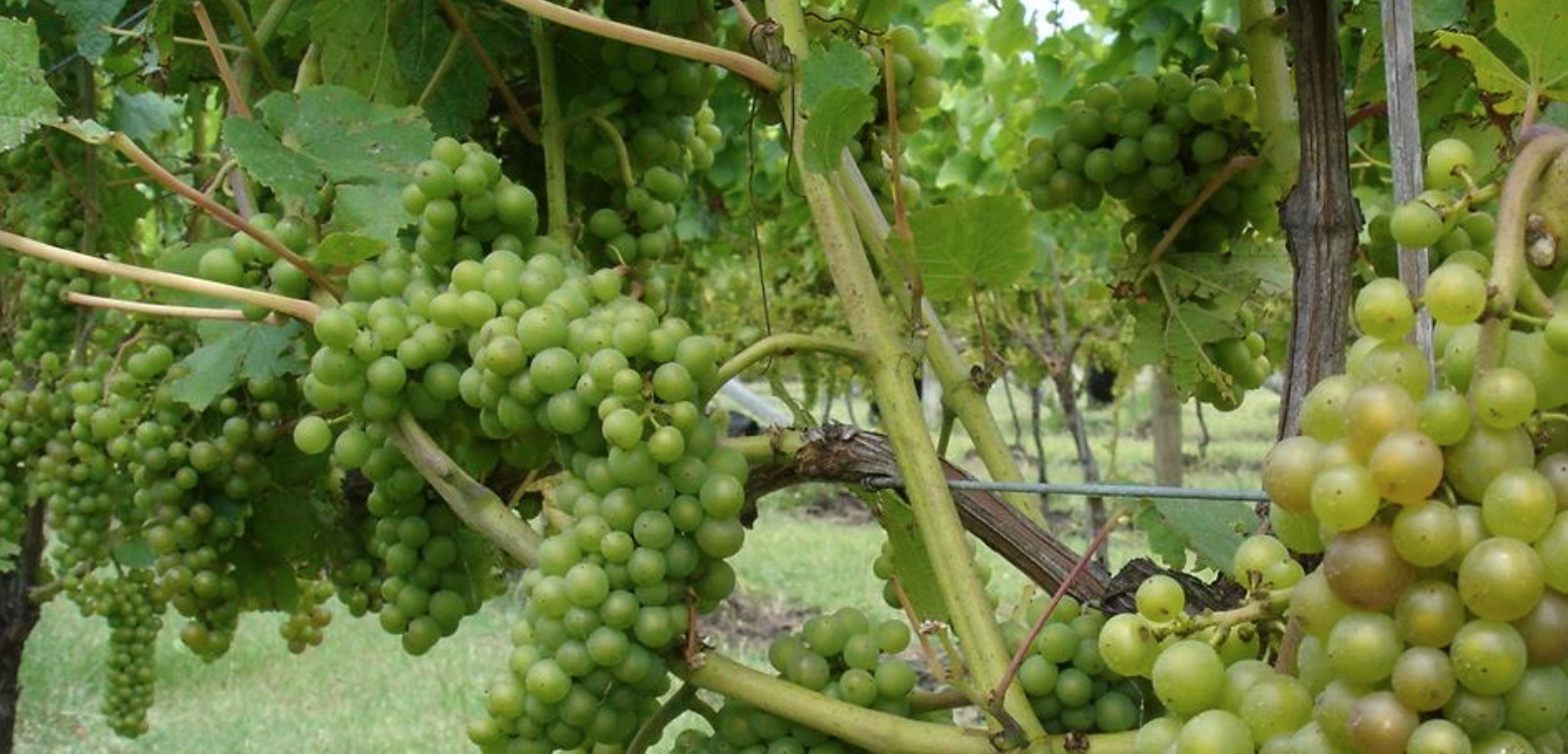
Technically, any white wine grape can be used to make orange wine.
However, some varieties of white grapes are more common or have been used to make traditional orange wine throughout history.
Here’s a list of orange wine grapes:
- Chardonnay*
- Gewurztraminer (and other traminers)*
- Grenache Blanc*
- Sauvignon Blanc*
- Malvasia di Candia Aromatica*
- Malvasi Istriana*
- Trebbiano di Toscana*
- Vitovska*
- Mtsvane Tsolikouri*
- Chenin Blanc
- Pinot Gris
- Riesling
- Albarino
- Friulano
- Vermentino
- Albillo Mayor
- Verdelho
- Cataratto
- Inzolia
- Roussanne
- Viognier
- Rkatsiteli*
- Ribolla Gialla*
(*) Indicates traditional orange wine grape varieties
Why Is Orange Wine So Strong?
Orange wine is strong because the juice extracts tannin from the seeds and skins of the grapes during fermentation. This adds texture in the form of astringency and bitterness to the wine. This also adds antioxidants to your orange wine, just like red wines.
Is Orange Wine Bitter?
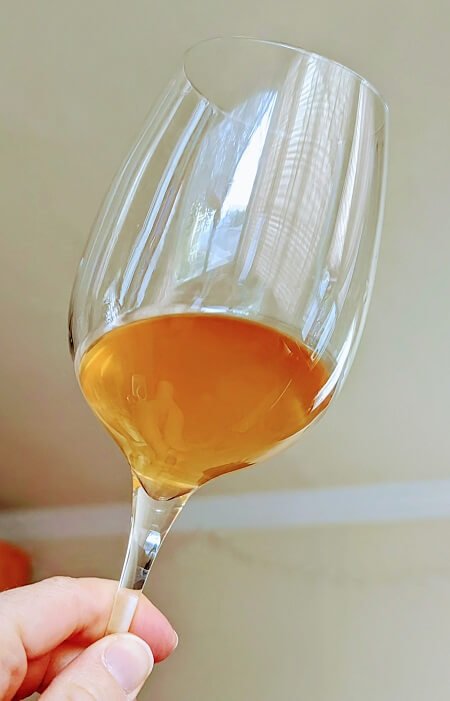
Some orange wines will taste bitter (astringent). The bitterness comes from tannins in the grapes’ seeds and stems that leeche into the wine during fermentation and as the winemaker keeps the new wine in contact with the skins after fermentation.
Helpful Tasting Tip: Check out this post to figure out if your wine is bitter or astringent. Bitterness can come from alcohol levels and even sunburnt grapes. Astringency comes from grape seeds and stems.
Orange Wine Buying Tip: If you want less-bitter orange wines, seek out wines that have less skin contact time (like 10 days). If you enjoy these bold, grippy flavors in orange wine, look for orange wines with more skin contact (100 days, or maybe even 1 year).
Does Orange Wine Need to Breathe?
Orange and amber wines can benefit by allowing them to breathe. The tannin in these wines will soften and the flavors will integrate if you swirl your glass or allow it to sit for 10-15 minutes before drinking.
Caveat: Don’t let a sparkling orange wine breathe. The bubbles will just go flat. Bummer.
Is Orange Wine a Natural Wine?
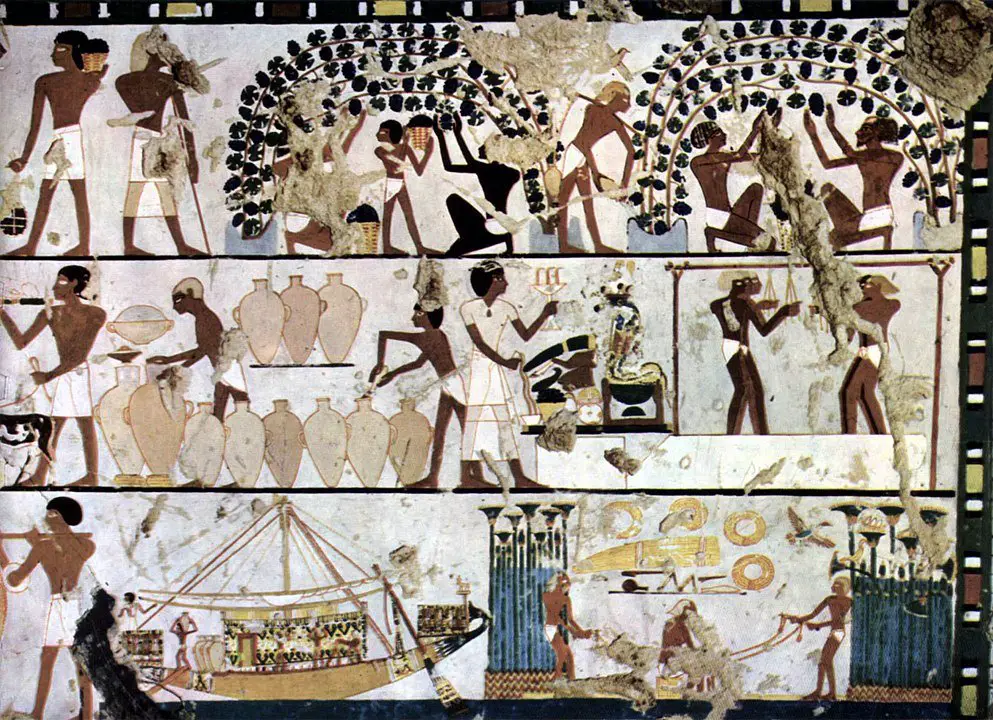
Many orange winemakers follow the contemporary “natural wine” movement using organic or biodynamic winegrowing and winemaking practices and minimal intervention in the winery, like using native yeast and minimizing sulfite additions.
This means your orange wine may have funky aromas caused by low levels of sulfites. Swirling your wine vigorously and allowing it to breathe can help blow off (reduce) the funkiness in your orange wine.
Helpful Tip: Natural wine isn’t actually a regulated term. Anyone can put this term on a wine bottle. Here’s a post on what natural wine means and what you need to know before buying a natural wine.
Does Orange Wine Have More Alcohol?
In general, orange wines fall on the lower end of medium alcohol (around 12% ABV). However, orange wines from warmer growing climates, like the Southern Rhone, may use riper grapes with higher sugar levels, resulting in wines with higher alcohol (14% ABV). Here’s a short list of alcohol levels from 5 random orange wines I picked up:
- 12% ABV
- 12.1% ABV
- 12.6% ABV
- 12.5% ABV
- 14% ABV
Quick Reminder: Sugar in grape juice ferments into alcohol thanks to yeast. The more sugar, the more alcohol. If you want lower-alcohol wines, look for bottles made in cooler regions. Boom! Easy! I’m here all day. Here’s an overview post on how wine fermentation works if you’re curious.
Is Orange Wine Rare?
Orange wines are rare in the wine world, though it is a growing niche. The average wine drinker isn’t expecting a zesty, astringent orange wine, especially if it forefronts earth, spice, or even a little funk instead of pure, juicy fruits.
Orange wine’s taste profile is unexpected. In general, winemakers need to make wines that will sell, so orange wines tend to be made in very small batches from boutique producers and sold at the winery or through specialty wine shops.
Look for orange wine at specialty wine shops or natural wine bars!
Is Orange Wine More Expensive?
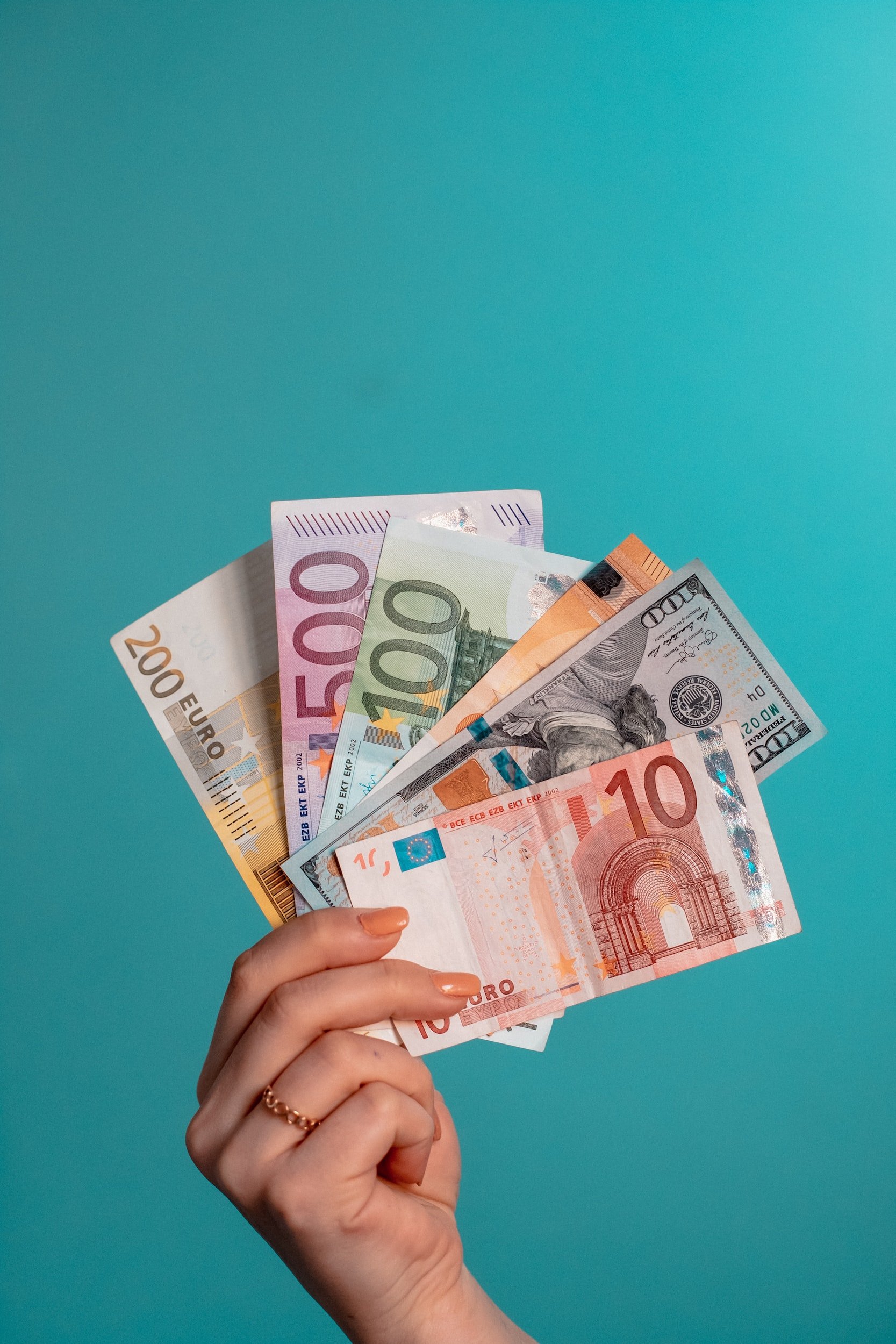
Orange wine is more expensive than a standard bottle of like-quality white wine because it involves additional winemaking steps. Whereas a typical white gets crushed and pressed all at one time, the orange wine stops after crush and then goes through fermentation.
If the orange wine goes through longer aging, this adds to the cost making it more expensive as well.
Fun Wine Fact: Celebrate National Orange Wine Day on October 6!
Is Pinot Grigio orange wine?
Pinot Grigio is a white grape typically used to make white wines (Pinot Grigio). However, Pinot Grigio can be used to make orange wines if the winemaker leaves the juice in contact with the grape skins through fermentation.
You may see the word “ramato” on a bottle of Italian Pinot Grigio, which means auburn.
Ramato wines are orange Italian wines, typically made from Pinot Grigio.
What Food Goes with Orange Wine?

Orange wines have more structure and spice to them than your typical white wine, so they make versatile pairing partners. Here are some foods that go with orange wine:
- Porchetta sandwiches
- Paninis
- Low country boils
- Cioppino
- Pizza with spicy sausage or red pepper flakes
- Carnitas tacos
- Empanadas
- Asiago cheese, blue cheese, smoked cheddar
- Fried chicken
- Chorizo or salami
Helpful Tip: If you’re just getting started out with wine, I put together this helpful overview of food with wine pairing to get you started. Side note – I spend just as much time thinking about food with wine pairing as I do deciding what I’m going to eat every night. Utter hedonism. What can I say?
How to Serve Orange Wine?
Use a standard white wine glass with a slightly tapered bowl for your orange wine. Sparkling orange wine should always be chilled.
Do You Decant Orange Wine?
Orange wines shouldn’t need decanting. However, the tannins can cause orange wines to taste tight. You may want to decant your orange wine for 15-20 minutes, or use an aerator while pouring your orange wine to help open it up. If you don’t have a decanter or an aerator, give the wine a healthy swirl.
Do You Chill Orange Wine?

Always chill sparkling and dessert orange wine. Some people prefer to drink their still orange wines chilled directly from the refrigerator; others prefer to drink their orange wines at a slightly warmer temperature than white wine, around 54°-57°F (12°-14°C), like a Pinot Noir.
The reason for drinking orange wines at a warmer temperature is that the wine will seem more aromatic and flavorful.
Nerdy Wine Fact: When your wine is warmer, the aroma molecules can break free of their chemical bonds more easily and make their way up to your nose. If you can’t smell anything in your wine, your wine might be too cold (or just not very well made). Here’s a 30-second tasting tip to figure out if you’re serving your white wine too cold.
Because you’re experimenting with orange wines, I recommend the following experiment:
- Chill your orange wine bottle down in the fridge for 2-3 hours (or overnight)
- Take your orange wine bottle out of the refrigerator about 30 minutes before you want to drink it.
- Pour yourself a glass and take a sniff and sip. See what you can get out of the wine.
- Let it sit for another 10-15 minutes and go back and swirl and sip again.
- Do you notice any changes in your orange wine’s power? If so, the wine was too cold the first sip, and it’s better served at a warmer temperature.
And don’t be afraid to give your orange wine a vigorous swirl. This is a complex wine that can reward you with nuanced layers of goodness.
Personal Note: I almost always drink my orange wines at room temperature in a red wine glass.
How Long Does Orange Wine Last Once Opened?
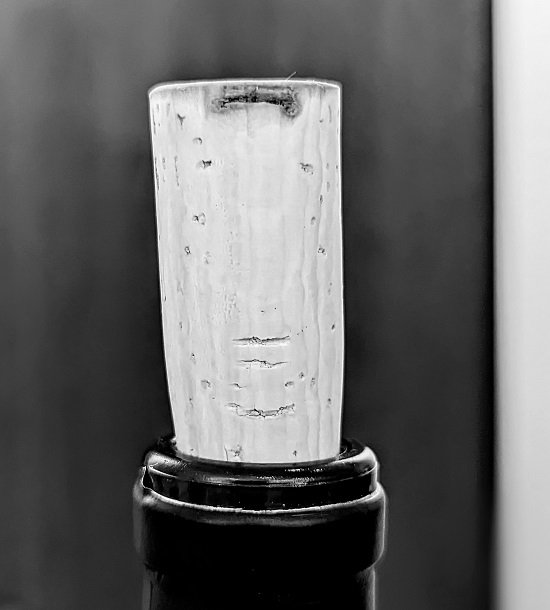
An open bottle of orange wine will last between 3-5 days if you store the bottle in the refrigerator (2-3 days if you leave it on the counter). Your orange wine should last slightly longer than a white wine thanks to the tannins, which act as a natural preservative. You can extend the life of your leftover orange wine by using a wine preservation system.
Helpful Tip: Check out this post that covers everything you need to know about storing leftover wines to maximize their lifespan. (I always have leftover wine, too.)
How Long Does Unopened Orange Wine Last?
If you have a bottle of orange wine that follows modern winemaking techniques with added sulfites, then you should enjoy your wine within 3-5 years (treat it like you would a lighter-bodied red wine).
If you purchased a natural low-intervention orange wine, plan on drinking it within 1 year (drink early, drink often).
Your orange wine doesn’t have sulfites that will protect it from spoiling. However, orange wine’s higher tannin levels do offer some protective qualities over a standard white wine.
Does Orange Wine Get Better with Age?
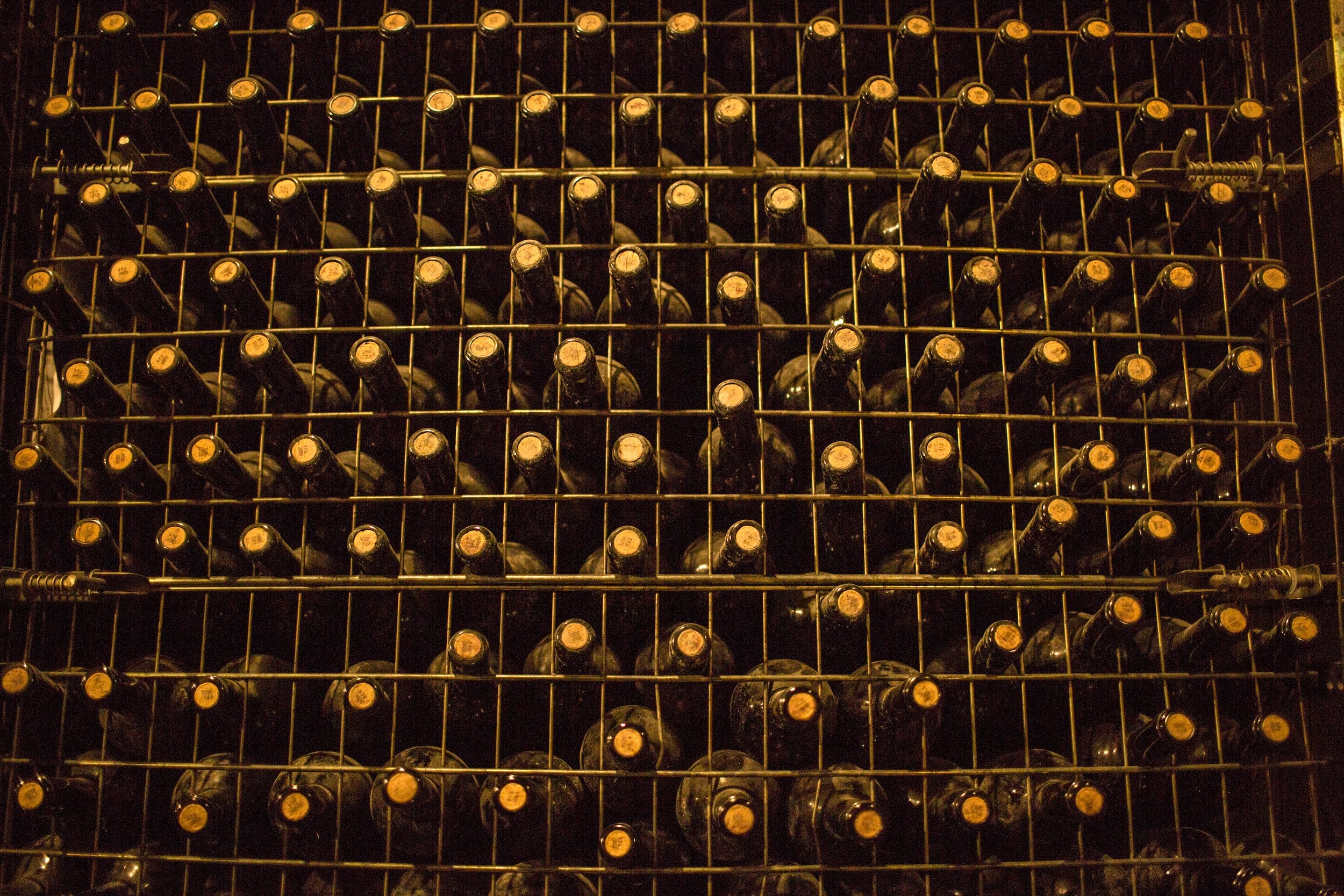
Most orange wines will not get better with age, especially orange wines made in a low-intervention style with no sulfites added. Drink these orange wines when you buy them.
Orange wines that are made with extended skin contact (i.e., several months to a year) and finished with modern winemaking techniques (i.e., added sulfites and filtering), will benefit from aging.
The increased tannin extraction from orange wines with longer skin contact will integrate with the other flavors in the wine over time, allowing your orange wine to harmonize.
Let pricepoint and the producer’s website be your guide.
More expensive orange wines that had longer skin contact will likely be better able to age.
Great Wine Read: Amber Revolution
If you’re ready to dive into orange wine, then I insist that you read Amber Revolution, by Simon Woolf. It’s a fantastic, sensual dive into the history of orange wine and how this unique wine has become the darling of wine enthusiasts the world over.
Helpful Tip: Go check out my full review of Amber Revolution here.
Final Thoughts – Orange Wine Puts the ‘Fun’ in Funky
Orange wines offer the perfect departure from your typical Chardonnay or Pinot Noir. Unique, unexpected, complex – all capture the spirit of orange wines. You’ll need to look for orange wine bottles at a specialty wine shop or at a small winery.
Orange wines are the antithesis of mainstream.
If you ever get the chance to do an orange wine tasting (or can muster up enough adventurous friends to host an orange wine tasting), just do it! This type of deep-dive will give you a glimpse at what’s possible in the world of orange wines.
Thirsty for More?
Natural Orange Wines are different than your typical orange wine (if you can call any orange wine typical). I put together this post on Natural Orange Wine that I recommend reading if you’re going down the natural wine route.
Orange wines come in several different styles. You’ll probably like some styles more than others. Check it out!
Aaaand, because orange wines have tannin in them, here’s a 30-second tasting tip on how to taste tannins to get you started off right. Enjoy!

